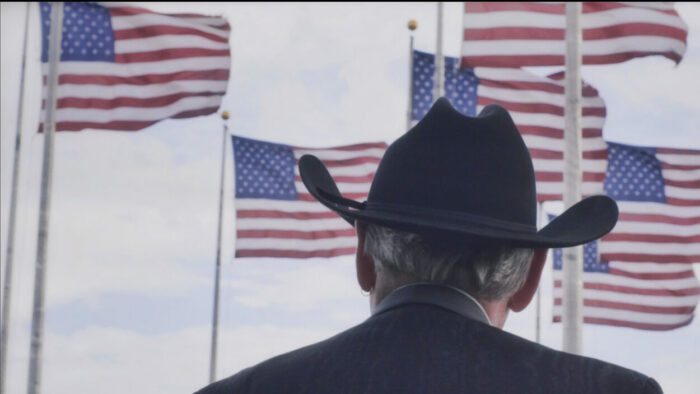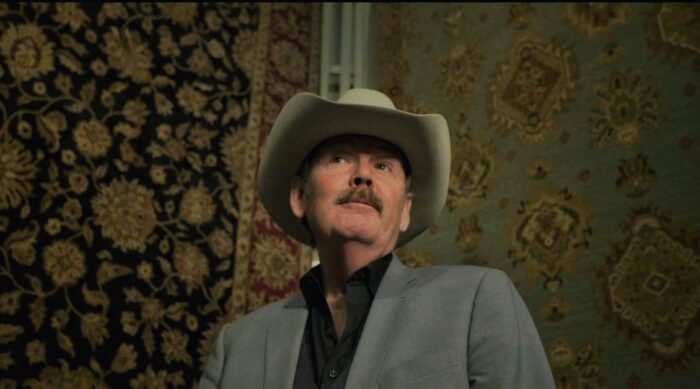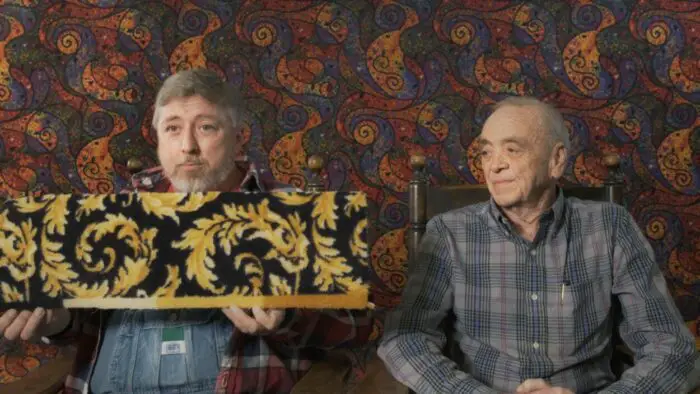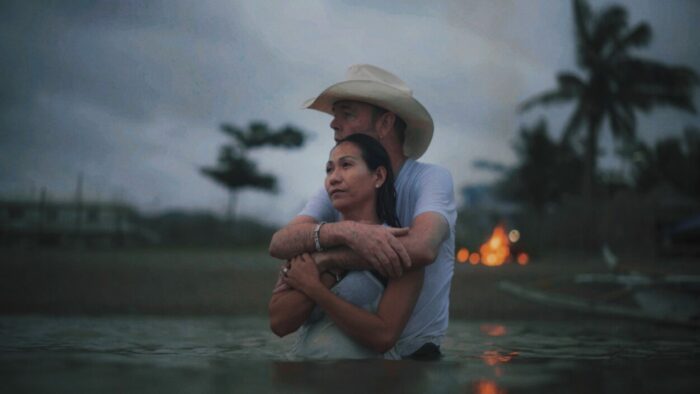There’s little better than a documentary that can find surprising insights and characters in what might otherwise seem the most mundane of places. The Maysles-Zwerin team did so with Bible-peddling salesmen and, later, two reclusive sisters; Errol Morris at a pet cemetery; Les Blank on the joys of garlic and gap-toothed women; Sarah Polley at her kitchen table; and Lance Oppenheim in The Villages. A great documentary can emerge from almost anywhere and need not be centered on a crime or mystery. Rather, almost like a social anthropologist, it can explore the quirks and cracks in the sundry everyday. Carpet Cowboys, a new documentary from first-time feature directors Emily MacKenzie and Noah Collier and executive produced by John Wilson (HBO’s How To With John Wilson), follows in that very tradition, with a cast of unique competitors in the carpet business.
That’s right, the carpet business. The design, production, and distribution of that nearly ubiquitous flooring surface we stroll and stride upon every day of our lives, but rarely give any thought to. Miles and miles and miles of carpet line not only our homes but our stores, hotels, workplaces, convention centers, and more. It’s big business—globally, a $50 billion industry—and in the U.S., almost entirely concentrated, surprisingly, in a single geographic location, in and around Dalton, Georgia (“Carpet Capital of the World”), where 85% of the nation’s carpets are manufactured and the cast of Carpet Cowboys collide.

None of these “Cowboys” (they are all men) rides a horse or ropes a steer, but they all see themselves in the mythic tradition of the American western cowboy, riding headward on into a changing future while clutching tightly to an identity forged from the specifics of a time and place. But in Dalton, and in the industry, times are changing, and their grip on their livelihood seems like it’s being wrested away by foreign competition, just as their carefully constructed identities seem more and more outmoded.
The most verbose and curious of the film’s subjects is Roderick James, a freelance textile designer with a larger-than-life personality. Over the decades since his emigration from Scotland to the U.S., he’s seen Dalton’s wealth consolidate to a select few, as the competing manufacturers buy each other out and in turn are bought out by foreign interests. A documentary, as Bill Nichols suggests, can thrive on the presentation of a single unique character, and while there is more than one cowboy on this carpet, James looms largest.

He’s a loquacious character, always looking with his iPhone camera for patterns—a split tree stump, a bound hay bale—that might make for an interesting design. Or slinging his guitar, searching for the melody that will make for a catchy jingle peddling his carpets’ virtues. He lives with a supportive male roommate who seems in many ways like a romantic partner (and the film stops just short of implying that any of these men’s relationships are more than homosocial), yet he is in love with a Filipino woman who wants to return to her home country. His cowboy hat is omnipresent, and he wears it well, but with his slight slouch and soft voice he’s more of a Montgomery Clift than a John Wayne. (He also wears, just in case one needs another signifier of his sympathies, an American flag as a scarf.) Sensing the industry’s on the cusp of a major turn, James steels himself for a major life decision that takes Carpet Cowboys in a surprising new direction.
That direction seems far afield from where the film begins, in Dalton, with evocative shots of miles of carpet being designed, manufactured, and trod upon. Along the way, we meet other characters, equally quirky if less visually interesting or memorable—there’s an 11-year-old Shark Tank entrepreneur with a temporary glue pitch, for whom James composes a jingle; the father-son Caldwell duo with 50 years in the business; and James’ cronies, who follow him around like groupies with guitars, listening to him opine about the majesty of carpet design. But they all pale in comparison to James himself: it’s as if halfway through, the filmmakers found the concept of the carpet industry far less interesting than the singular character sauntering about in its midst and in the midst of his own midlife crisis.

Like Oppenheim’s Some Kind of Heaven, Carpet Cowboys treats its subjects with some ironic distance. The characters open up and discuss their dreams and anxieties, only to have the filmmakers treat them a little like critters in a cage whose foibles resemble nothing so much as lo-fi cringe comedy. The approach makes for some fascinating filmmaking, if you are comfortable with the ethics of the situation. No documentary subject is guaranteed a charitable presentation by the filmmaker, but it’s hard not to wonder what James and the “carpet cowboys” think of the way they are presented here. Yes, they may well be pursuing a dream that is largely mythical, hitching themselves to a version of rugged individualism that has little place in a 21st-century global marketplace. But are they worthy of scorn?
Carpet Cowboys seems to think so, with promotional materials touting a review citing the film’s “delusional ‘straight’ white men” and its “healthy heap of cringe to wash it down” (credited to T. J. Martin of Undefeated). That perspective may not be the only interpretation one can lend to the film, but it’s one many will embrace: look at these losers, some will think, clinging to an outdated notion of privileged white masculinity while times change around them. That’s one way to read the film, I suppose, and it’s one the film itself seems to invite, but it’s also possible to see in James and his cadre a somber, even sympathetic portrait of a group of men for whom a dream based on economic profit and capitalist progress might not be by itself sufficient for true happiness.

Maybe, just maybe, there’s a happiness to be found outside the Carpet Capital of the World. While Carpet Cowboys seems at times like a bit of a mashup between two different films—one set entirely in the carpet industry of Dalton, the other focused entirely on Roderick James and his journey beyond it—the film’s heady mix of Errol Morris-like quirk and high cinematic style makes it, for any fan or student of documentary, well worth the watch. Even in the most mundane of places, documentaries like this are capable of finding the oddball and the offbeat around the very periphery of the American Dream, where its heart still beats, if just a little muted.
Carpet Cowboys opens in New York at the Metrograph Theater August 25, 2023 and in Los Angeles September 15, with more cities to follow. 85 mins / USA / 2023 / English.




